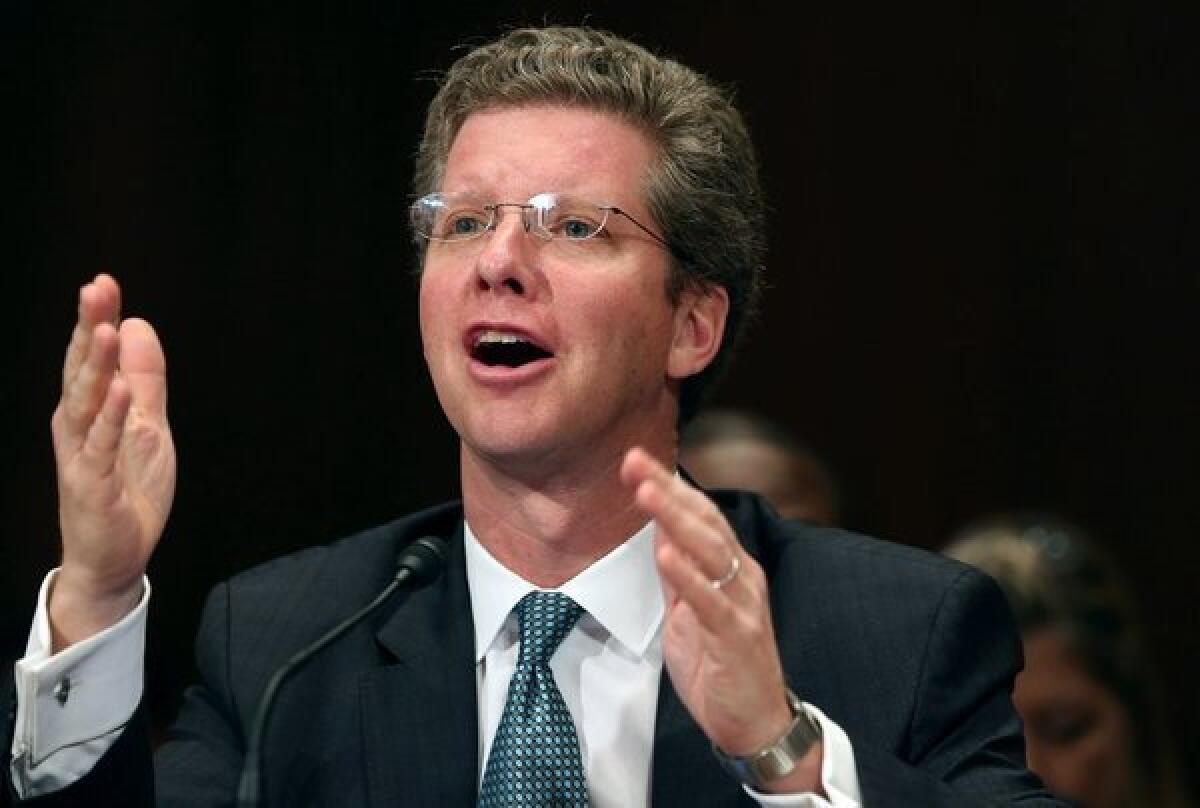HUD Secretary Donovan says he can’t promise FHA won’t need bailout

WASHINGTON -- A top Obama administration official said Thursday that he could not guarantee that efforts to shore up a key government housing agency won’t save it from needing a taxpayer bailout next year.
But Housing and Urban Development Secretary Shaun Donovan cautioned senators worried about the increasingly precarious finances of the Federal Housing Administration that making hasty changes to its operations could endanger the housing recovery.
Sharp revisions to FHA’s standards for insuring mortgages -- often for first-time, lower income home buyers -- could dampen the recovery and lead to more foreclosures that further reduce the size of the fund the agency uses to cover its losses.
“We are seeing a recovery, but it is still fragile,” Donovan told the Senate Banking Committee. “We don’t want to hurt the market and in turn the FHA fund by going too far and stopping that recovery.”
But several senators were critical of the way FHA operates and the steps taken over the past four years by HUD, which oversees the agency, to stabilize its finances.
The FHA, for example, insures mortgages with as little as 3.5% down-payment and has backed loans for people who went through foreclosures as recently as three years earlier.
The agency said last month that its reserves to cover losses dropped into negative territory for the fiscal year that ended Sept. 30.
Under law, the FHA’s net worth must not drop below 2% of the outstanding balances of the loans it guarantees. But hit by the collapse of the housing market, the agency’s so-called reserve ratio has been dropping since 2006 and ended the 2012 fiscal year at minus-1.44%.
“Hopefully, the shock produced by these latest projections will finally be a wake-up call for everyone,” said Sen. Richard Shelby (R-Ala.). “It is time for serious reform of the FHA before it needs a taxpayer bailout, if it isn’t too late already.”
The agency, which is funded by mortgage insurance premiums it charges to homeowners, had $30.3 billion in cash reserves as of Sept. 30 to cover $46.6 billion in projected losses in coming years.
The shortfall could force it to tap the U.S. Treasury, as it is legally allowed to do, for the first time in its 78-year history to shore up its finances.
Democrats and Republicans said they were concerned about that possibility. But while Republicans pushed for quicker action by the FHA, Democrats cautioned that the FHA plays a key role in the housing market.
The agency insures more than $1 trillion worth of mortgages and has backed about 14% of new loans made this year. It played a critical role in keeping the housing market afloat after the subprime bubble burst and is paying the price for loans it backed between 2007 and 2009.
“There is a clear case to be made in my mind that but for FHA in the midst of this housing crisis we would have a far greater crisis on our hands,” said Sen. Robert Menendez (D-N.J.).
Donovan said the FHA has been raising the insurance premiums it charges to homeowners and plans another increase, by an average of about $13 a month, for new loans it backs. The agency also plans to sell at least 40,000 delinquent loans a year and streamline short sales to reduce losses from foreclosures.
The changes “have significantly decreased” the chances of a bailout, Donovan said. But pressed by Sen. David Vitter (R-La.), Donovan would not predict the likelihood the FHA would need to draw taxpayer money.
A determination would not be made until the end of the 2013 fiscal year, Donovan said.
Some Republicans pushed the administration to act more quickly to make changes at the FHA.
Sen. Bob Corker (R-Tenn.) said he did not understand why the FHA was backing loans for homeowners who recently went through foreclosure.
Donovan said the agency was considering revising its standards for people who have undergone foreclosures. But he stressed that, in some cases, those were responsible borrowers who simply lost their jobs during the recession.
“We believe if somebody can show they are back at work and are a responsible borrower again, that’s somebody we should work with,” he said.
Donovan said Congress could help the FHA by making some changes that the agency is unable to do on its own.
He noted that lawmakers last year reduced loan limits for Fannie Mae and Freddie Mac to $625,500 but kept the FHA limit at $729,750. Lowering the FHA limit would help the agency, Donovan said.
ALSO:
FHA’s reserves fall into the red
Home prices show biggest jump in 6 years in October
FHA gives those who defaulted on homes another chance
Follow Jim Puzzanghera on Twitter and Google+.
More to Read
Inside the business of entertainment
The Wide Shot brings you news, analysis and insights on everything from streaming wars to production — and what it all means for the future.
You may occasionally receive promotional content from the Los Angeles Times.










